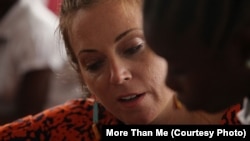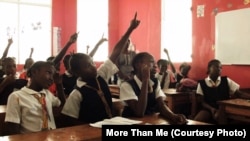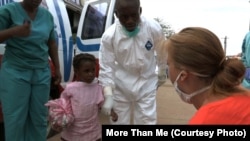Katie Meyler identifies with many of the girls she encounters in West Point, an impoverished neighborhood in Liberia’s capital, Monrovia.
"I do see myself oftentimes in these kids," said the 33-year-old, a curious, exuberant New Jersey native with a penchant for breaking into song. Like them, she has known deprivation, though to a lesser degree. "… Empathy has a lot to do with what drives me. I grew up poor in America. But, despite the poverty we lived in, there were safety nets."
For almost a decade, Meyler has thrown herself into helping reconstruct a Liberian safety net tattered by a seven-year civil war (it ended in 1996), enduring poverty and, most recently, the deadly Ebola epidemic.
Arriving in 2006 to work with the U.S.-based international charity Samaritan’s Purse, Meyler ran adult literacy programs in remote villages, traversing a landscape she describes as "beautiful" but "full of struggle." She met youngsters such as 11-year-old Abigail, who routinely performed oral sex on men in exchange for clean drinking water. "Her biggest dream was to go to school. There’s no way you could walk away from that."
Meyler contributed tuition money for Abigail and a few other girls. But the demand quickly outpaced what she could personally afford. When she fretted about lacking the money and power to help, a friend set her straight, saying,
"It’s not about you."
That focal shift emboldened Meyler to dream up More Than Me – a foundation that in 2009 began providing tuition and school supplies to poor girls – and to seek support from donors and online crowdfunding. In late 2012, it won $1 million from JPMorgan Chase through its annual American Giving Awards, determined by Facebook vote. Liberian President Ellen Johnson Sirleaf bought into the idea, too, offering a vacant, two-story building for a school.
Getting girls off the street
The More Than Me Academy – Liberia’s first tuition-free school for girls – opened in September 2013, offering classes from kindergarten through sixth grade.
"We focus on the most vulnerable young girls," those on the street at risk of sexual exploitation, Meyler said. That year in Liberia, where nearly two-thirds of its residents live in poverty, just over four in 10 girls were enrolled in primary school.
Starting a school was challenging enough. Then, just months into the academic year, the Ebola epidemic struck. By summer, it was raging in Liberia, Guinea and Sierra Leone. Liberian schools closed to contain the outbreak.
But rather than “just waiting on the sidelines to see whether any of our students would be hit,” Meyler pushed to broaden More Than Me’s mission and turned the school building into an Ebola community outreach center.
Community offered guidance
The foundation team asked West Point residents what they needed most. An ambulance, they said. Thanks to a private donor, an ambulance arrived September 7, 2014 – exactly a year after the school’s opening. Community members chose the drivers, including students’ fathers, for training from the Doctors Without Borders medical charity. Meyler said the ambulance response time, which previously had stretched up to four interminable days, fell to 30 minutes.
The school building also functioned as a pediatric observation center where homeless youngsters were monitored for up to 21 days, the disease’s incubation period.
"We basically were quarantining children with Disney movies and ice cream," Meyler said. Of the 20-plus children who stayed there, only a couple showed symptoms and had to be transferred to treatment units. "But none of them wound up dying."
Meyler – recognized by TIME Magazine for her Ebola work – saw far too much death on the streets and while comforting the sick. She’s especially pained by the memory of Charlie, a little boy she’d seen in a holding center. Hours after meeting him, she went back and, in protective gear, "handed out ice cream and toys and sang and prayed with people ... squashing through the vomit and the blood."
She found Charlie, barely alive, "and put a blanket on him.... I never saw him again."
Challenges continue
Liberia was recently declared Ebola-free – for a second time – and schools reopened in early September. Some 150 students now fill the More Than Me Academy classrooms, with Liberian teachers replacing foreigners who left during the epidemic. An American, veteran Peace Corps teacher Laura Smith, remains as principal, freeing Meyler for fundraising, promotion and other foundation work.
This is hardly the time for complacency, Meyler insists.
"Unless you fix the infrastructure of the country, starting with basic education, nothing is gonna change," she said. "You’re just treating symptoms."
So she asked Liberia’s education minister, George K. Werner, how she and More Than Me might help with a rescue effort.
"He asked us to participate in a two-year pilot program" of getting extra resources for two government schools in each of Liberia’s 15 counties, Meyler said.
The effort will adopt some strategies from More Than Me, which provides students with regular meals to avert malnourishment. A staff nurse "teaches girls about sanitation, feminine hygiene, family planning." Social workers advise girls on how to avoid, or report, sexual violence, and they counsel parents on how to support education and use positive disciplinary measures.
This latest assignment “sounds overwhelming,” Meyler admits. To fund it, she launched another Facebook crowd-sourcing campaign seeking $4-a-month donations for a year. She’s persuaded the General Electric company to sponsor a video.
The goal, she says, is "making sure that every girl is empowered.... The bigger message to be told is that no matter who you are or where you come from, you can make a difference."
Meyler is living proof of that.






